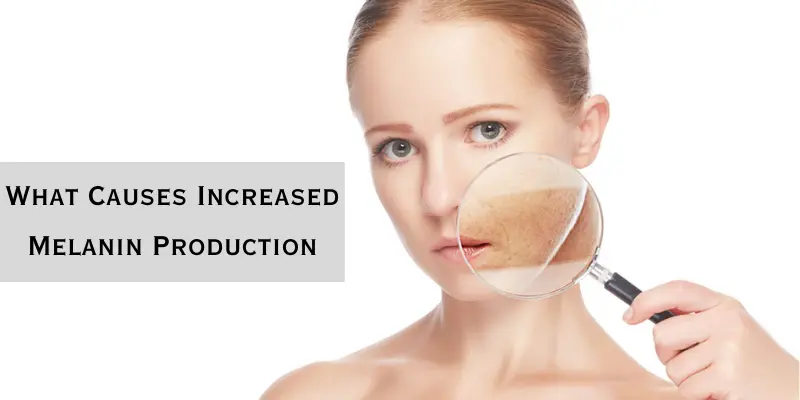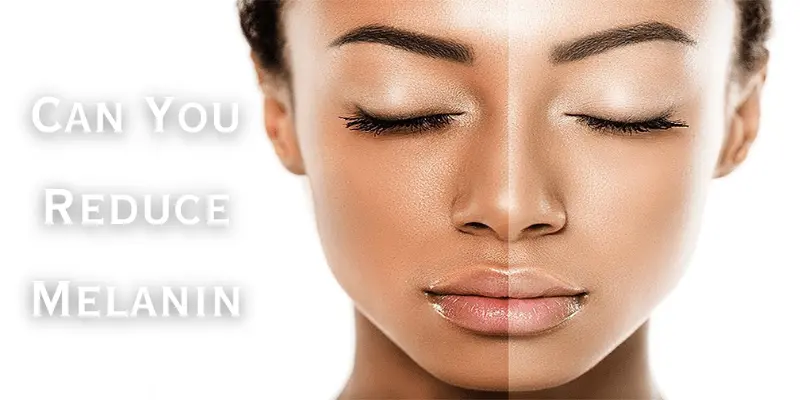How to Reduce Melanin in Skin: Safe & Effective Methods for You
Published: 14 Feb 2025
Melanin is a natural pigment found in your skin that gives it color. It’s produced by cells called melanocytes, and the amount of melanin in your skin determines its tone. The more melanin you have, the darker your skin will be. Melanin also helps protect your skin from harmful UV rays.
If you’re wondering how to reduce melanin in skin, it’s possible through various methods. Some people use skin-lightening products or treatments to reduce melanin, but it’s important to be cautious and follow safe practices.Here, we’ve shared some important methods you need to know, so let’s dive into your comprehensive guide.
What Causes Increased Melanin Production in the Skin?

Melanin production in your skin can increase naturally due to several factors. It’s mainly determined by genetics, so some people are born with darker skin tones. But there are also other things that can cause your skin to produce more melanin, like certain environmental factors and health conditions.
Key Factors That Affect Melanin Production
- Hormonal Imbalances: Changes in your hormones, like during pregnancy or taking birth control, can trigger more melanin production.
- Sun Exposure: The sun is one of the biggest factors. When your skin is exposed to sunlight, it makes more melanin to protect itself.
- Inflammation and Skin Irritation: Any injury or irritation to the skin, like acne or cuts, can cause more melanin to form as part of the healing process.
- Vitamin Deficiencies: A lack of certain vitamins, like Vitamin D or B12, can affect melanin production.
- Health Conditions: Some conditions, like Addison’s disease, can lead to increased melanin levels in the skin.
Can You Reduce Melanin in the Skin?

Yes, you can reduce melanin in your skin, but it’s not always easy. Melanin production can be slowed down with certain treatments, but results may vary from person to person. It’s also important to understand that completely and permanently reducing melanin is not always possible, especially if it’s influenced by your genetics.
How to Slow Down Melanin Production
- Use Sunscreen: Protecting your skin from the sun prevents your body from making extra melanin.
- Skin-lightening Products: These products can help reduce melanin over time, but it’s important to use them safely and with care.
- Avoid Irritation: Reducing skin inflammation can stop your skin from producing more melanin as part of the healing process.
Is it Possible to Permanently Reduce Melanin?
Unfortunately, it’s unlikely to permanently reduce melanin, especially if your skin color is mainly determined by genetics. While treatments may lighten skin temporarily, they may not offer long-term changes.
The Role of Genetics in Melanin Levels
Your genetic makeup plays a huge role in how much melanin you produce. People with naturally darker skin will likely always have more melanin. So, even with treatments, you may not be able to change your skin’s melanin production drastically.
How to Reduce Melanin in Skin Safely and Effectively
If you’re looking to reduce melanin in your skin, there are a few safe and effective methods you can consider. It’s important to choose the right options and take good care of your skin. Let’s look at some of the most popular and proven methods.
1. Professional Treatments
- Laser Therapy: Laser treatments can target the deeper layers of the skin, reducing excess melanin. It works by breaking down the pigment. You may need several sessions, and results vary depending on your skin type.
- Light-Based Therapy (IPL): IPL is a treatment that uses light to target melanin and reduce pigmentation. It’s less invasive than laser therapy and is often used for more surface-level pigmentation.
2. Topical Treatments
- Skin Creams and Serums: Some creams and serums are designed to lighten skin by reducing melanin. Common ingredients include:
- Hydroquinone: Known for its ability to lighten dark spots.
- Kojic Acid: A natural skin-lightening agent.
- Vitamin C: It brightens the skin and helps reduce discoloration.
- Prescription Ointments: Sometimes, stronger treatments are needed. A dermatologist can recommend prescription-strength ointments if over-the-counter products aren’t enough.
3. Sunscreen and Sun Protection
- Why It’s Essential: Sunscreen helps prevent your skin from producing more melanin when exposed to UV rays. Without protection, your skin will make extra melanin to guard against the sun’s harmful rays, which can darken spots.
- Choosing the Right SPF: Use sunscreen with at least SPF 30 to protect your skin effectively. For sensitive or fair skin, go for SPF 50 or higher.
- Tips for Preventing Further Pigmentation: Always apply sunscreen before going outside, even on cloudy days. Reapply every two hours, especially if you’re swimming or sweating.
Natural Remedies for Reducing Melanin in Skin
If you’re looking for natural ways to reduce melanin in your skin, there are a few simple remedies you can try. These options are gentle on the skin and can help lighten dark spots or even out skin tone over time. Let’s take a look at some of the most popular natural remedies.
1. Aloe Vera Gel
Aloe vera is known for its soothing and skin-lightening properties. It can help reduce melanin and fade dark spots. Just apply fresh aloe vera gel to your skin and leave it on for about 20 minutes before rinsing off. It’s gentle and works best when used regularly.
2. Lemon Juice
Lemon juice is a natural bleaching agent, so it may help lighten your skin. However, it’s important to be cautious as lemon juice can irritate sensitive skin. If you try it, dilute the lemon juice with water and only apply it for a short period. Always moisturize after use.
3. Turmeric
Turmeric has anti-inflammatory properties that help brighten the skin and reduce melanin. You can make a paste by mixing turmeric with milk or honey and apply it to your skin for about 10-15 minutes. It not only helps lighten the skin but also soothes any irritation.
4. Green Tea
Green tea is packed with antioxidants that benefit your skin. Drinking it regularly or using it as a face toner can help promote healthy skin and even out your complexion. The antioxidants in green tea help protect skin from damage and reduce pigmentation.
What to Avoid
While natural remedies can be effective, it’s important to avoid harsh treatments like skin bleaching. These can damage your skin and cause more harm than good. Stick to gentle, proven methods and always patch-test products before full use.
Diet and Nutrition: Can Food Affect Melanin Production?
Yes, the food you eat can affect melanin production. A healthy diet with the right vitamins and antioxidants can help balance melanin levels in your skin. Let’s take a look at which foods can help and how they can make a difference.
Foods That May Reduce Melanin
Certain foods are rich in vitamins and antioxidants, which can help lighten the skin and reduce melanin production. These include:
- Vitamin C-rich foods: Like oranges, strawberries, and bell peppers, which help reduce dark spots and brighten the skin.
- Vitamin E-rich foods: Such as almonds, spinach, and avocados, which protect skin cells and reduce pigmentation.
- Foods high in antioxidants: Like berries, green leafy vegetables, and tomatoes, which fight free radicals and help balance melanin.
What Vitamins Can Help Balance Melanin Levels?
- Vitamin A: Found in carrots, sweet potatoes, and dark leafy greens, vitamin A helps improve skin texture and color.
- Vitamin C: Not only brightens the skin but also helps control melanin production. It’s found in citrus fruits, tomatoes, and broccoli.
- Vitamin E: This vitamin helps protect skin from damage and keeps it looking smooth and even. You can find it in nuts, seeds, and olive oil.
The Role of Hydration in Skin Health
Drinking enough water is essential for skin health. Hydration helps maintain your skin’s elasticity and overall appearance. When your skin is hydrated, it’s more likely to heal and function well, including controlling melanin production.
How Long Does It Take to See Results in Reducing Melanin?
When it comes to reducing melanin, patience is key. Whether you’re using treatments, natural remedies, or changing your diet, it takes time to see results. Let’s break down what you can expect and how long it may take to notice changes.
What to Expect in the First Month
In the first month, you might start noticing small changes, like fading dark spots or slightly brighter skin. However, results will be gradual, and it’s normal for your skin to take time to adjust. Don’t expect overnight transformations, but consistency will pay off.
Long-Term Commitment for Visible Results
For noticeable and lasting results, you’ll need to stay committed for at least 3 to 6 months. Treatments like creams, laser therapy, or natural remedies take time to show full effects. The key is to stick with your routine and be patient.
Importance of Consistency with Treatments and Sun Protection
Consistency is essential for reducing melanin. Always follow your skincare routine and use sunscreen daily to protect your skin from further darkening. Without proper sun protection, your skin will keep making more melanin, which can slow down your progress.
The Risks and Precautions of Reducing Melanin
While reducing melanin can help with skin concerns like dark spots, it’s important to be aware of the risks. Using products or treatments incorrectly can lead to skin damage. Let’s take a look at some of the risks and the precautions you should take to keep your skin safe.
Overuse of Skin-Lightening Products and Potential Side Effects
Using skin-lightening products too much can harm your skin. Some of the side effects include:
- Skin irritation: Redness, burning, or itching.
- Thinning of the skin: Overuse can make your skin more fragile and prone to damage.
- Uneven skin tone: Sometimes, overuse can lead to patches of skin being lighter than the rest.
Skin Sensitivity and How to Protect Your Skin During Treatments
When using treatments or skin-lightening products, your skin might become more sensitive. To protect your skin:
- Use sunscreen: Always wear sunscreen to prevent your skin from darkening further.
- Patch test: Test new products on a small area of your skin to check for any reactions.
- Moisturize regularly: Keep your skin hydrated to prevent dryness or irritation.
The Importance of Consulting a Dermatologist Before Trying New Treatments
Before starting any treatment to reduce melanin, it’s always a good idea to consult a dermatologist. A professional can help you:
- Choose the best treatment for your skin type.
- Guide you on the proper use of products.
- Avoid potential side effects.
FAQs
1. How can I reduce melanin in my skin naturally?
To reduce melanin naturally, you can try using aloe vera gel, lemon juice, turmeric, or green tea. These natural remedies help lighten the skin gradually. Always be consistent and patient when using them for the best results.
2. Which food is best for reducing melanin?
Foods rich in Vitamin C, E, and antioxidants are great for reducing melanin. Citrus fruits, spinach, and almonds are excellent choices. They help reduce dark spots and balance melanin production in your skin.
3. How do you lighten melanin skin?
To lighten melanin skin, you can use treatments like laser therapy, light-based therapy, or skin-lightening creams. You should also protect your skin with sunscreen to prevent further melanin production. Consistency in your skincare routine is key.
4. Can Vitamin C reduce melanin?
Yes, Vitamin C is known to help reduce melanin production and lighten dark spots. It brightens the skin and inhibits melanin production. You can find Vitamin C in foods like oranges and use serums containing it for skin care.
5. How to reduce melanin in skin naturally?
To reduce melanin in the skin naturally, use ingredients like lemon juice, aloe vera, or turmeric. These natural remedies can gradually fade dark spots and brighten your complexion. Always patch-test before applying them to your face.
6. How to reduce melanin in skin by food?
Eating foods rich in antioxidants and vitamins can help reduce melanin. Vitamin C and Vitamin E-rich foods like citrus fruits, tomatoes, and almonds are particularly beneficial. These nutrients help balance melanin levels and brighten the skin.
7. How to reduce melanin in skin home remedies?
Home remedies like applying aloe vera, lemon juice, or turmeric masks can help lighten skin and reduce melanin. You can also try drinking green tea for its antioxidant properties. Be gentle and patient when using these remedies for best results.
8. How to reduce melanin in your eyes?
Reducing melanin in your eyes is difficult, as it is largely controlled by genetics. However, maintaining eye health through a balanced diet and protecting eyes from UV rays with sunglasses can help. Talk to an eye specialist for more guidance if needed.
9. Is it safe to use skin-lightening products?
Skin-lightening products can be safe if used correctly, but overuse can lead to side effects like irritation or thinning skin. Always follow the instructions and consult a dermatologist if you’re unsure. Sunscreen is essential when using these products.
10. How long does it take to see results in reducing melanin?
It usually takes about 3-6 months to see visible results in reducing melanin, depending on the method you use. Be patient and stay consistent with your skincare routine. Results can vary, so it’s important to keep up with treatments regularly.
Conclusion
So, in this article, we’ve covered how to reduce melanin in skin in detail, exploring both natural remedies and professional treatments. It’s important to remember that while it’s okay to want to even out your skin tone or reduce dark spots, embracing your natural skin tone is just as essential. Be sure to prioritize your skin’s health and well-being as you explore safe options.
Ultimately, reducing melanin should be done in a careful and informed manner. From using Vitamin C-rich foods to professional treatments like laser therapy, we’ve discussed various methods. Just remember, consistency and sun protection are key, and always consult a dermatologist if you’re unsure about the best option for your skin.

- Be Respectful
- Stay Relevant
- Stay Positive
- True Feedback
- Encourage Discussion
- Avoid Spamming
- No Fake News
- Don't Copy-Paste
- No Personal Attacks

- Be Respectful
- Stay Relevant
- Stay Positive
- True Feedback
- Encourage Discussion
- Avoid Spamming
- No Fake News
- Don't Copy-Paste
- No Personal Attacks






